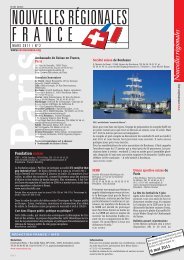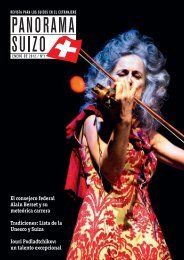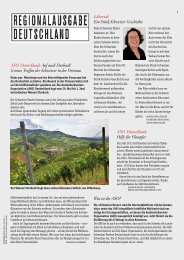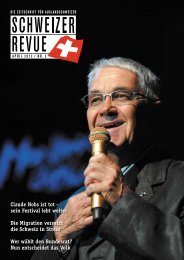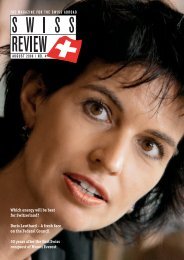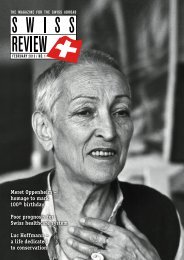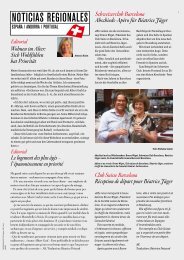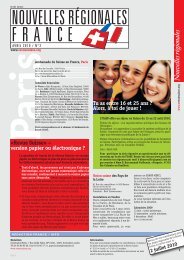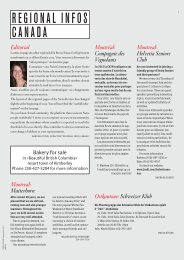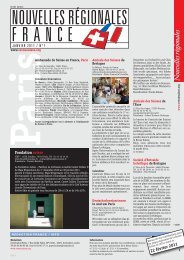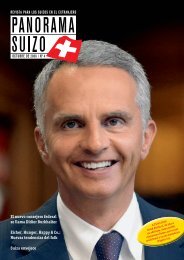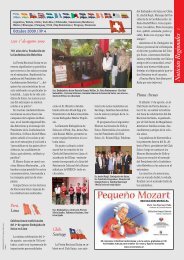Download PDF Swiss Review 1/2012 - Schweizer Revue
Download PDF Swiss Review 1/2012 - Schweizer Revue
Download PDF Swiss Review 1/2012 - Schweizer Revue
You also want an ePaper? Increase the reach of your titles
YUMPU automatically turns print PDFs into web optimized ePapers that Google loves.
20 Culture<br />
A biologist becomes a TV star<br />
“Netz Natur” (Nature Network) is one of the most popular shows on <strong>Swiss</strong> TV. Biologist Andreas<br />
Moser manages to attract around 400,000 viewers eight times a year and has been doing so for<br />
almost 20 years. But he doesn’t feel like a star - he’s too shrewd and dedicated for that.<br />
By Heinz Eckert<br />
swiss <strong>Review</strong> January <strong>2012</strong> / No. 1<br />
Photos: sRF<br />
Andreas Moser’s interest in animals stems<br />
from his background and family. Having<br />
grown up near to Basel Zoo, or “Zolli” as the<br />
locals call it, Moser spent a lot of time with<br />
his grandfather in the zoological garden,<br />
came into contact with animals and keepers,<br />
sometimes helping them with their work,<br />
and learned a great deal about animals in the<br />
process. These experiences influenced his<br />
choice of career and the course of his life. He<br />
actually wanted to become a zookeeper, but<br />
his parents persuaded him to finish his<br />
school education first and go on to university<br />
as well. He chose biology, majoring in<br />
zoology. He carried out field studies on indigenous<br />
reptiles during his degree course at<br />
the University of Basel and soon became an<br />
expert on snakes.<br />
After graduating, Andreas Moser ran the<br />
poisonous animals laboratory at the <strong>Swiss</strong><br />
Tropical Institute in Basel as an academic assistant<br />
and laboratory chief. There he was<br />
responsible for keeping poisonous snakes,<br />
spiders and scorpions.<br />
Successor to a legend<br />
Instead of taking up the opportunity available<br />
to him to travel to Africa to carry out further<br />
research into poisonous snakes, Moser joined<br />
the <strong>Swiss</strong> state television company in<br />
1987. He worked on the “Karussell” programme<br />
and began producing TV programmes<br />
on natural history. When the highly successful<br />
“Karussell” came to an end, he joined<br />
the “Menschen-Technik-Wissenschaft” editorial<br />
team. The concept of “Netz-Reportage<br />
aus der Natur” was developed here as a<br />
successor to the well-known productions of<br />
Hans A. Traber. Moser has been the<br />
programme’s presenter since 1989 and its<br />
head of editorial content since 1993. Last<br />
year, the programme featured the following<br />
topics: “All about the cow”, “Switzerland – a<br />
cow nation?”, “Who stinks here?”, “Wild nature<br />
– money or life”, “Mangroves – apes,<br />
crabs and crocodiles”, “Horned animals” and<br />
“Animals – creatures of honour”.<br />
Moser is highly committed to and a strong<br />
advocate of the interests of animals and nature,<br />
but he is certainly no missionary. A natural<br />
scientist to the core, he analyses situations,<br />
makes deductions and draws<br />
conclusions. He presents these to viewers in<br />
an easy-to-understand way, but without dramatic<br />
or pedagogic undertones.<br />
The wolf and the sheep<br />
He adopted the same approach when the<br />
<strong>Swiss</strong> Parliament expressed concern about<br />
wolves migrating back to Switzerland. Moser<br />
said that the killing of sheep and goats by<br />
wolves was a problem of man’s own making.<br />
“Wolves treat unattended pets as part of nature”,<br />
he explained to Parliament. The 10 or<br />
so wolves living in Switzerland kill around<br />
350 sheep and goats a year. That is a small<br />
number in relation to the 4,000 to 10,000<br />
sheep “which die each year, sometimes in excruciating<br />
pain, due to accidents and diseases<br />
because shepherds leave them to graze in<br />
the mountains for weeks or months on end<br />
without supervision or protection”.<br />
Moser pointed out that sheep on the Alps<br />
need constant shepherding and occasional<br />
treatment from a vet in the same way as pets.<br />
They require protection at night, ideally<br />
through electric fencing, and shepherds and<br />
sheepdogs are also needed to look after the<br />
flock. “Sheep looked after in this way are<br />
rarely in danger from wolves”, said Moser,<br />
emphasising that federal government pays<br />
farmers 43 million <strong>Swiss</strong> francs a year in subsidies<br />
for keeping sheep. He said this funding<br />
should also be used to keep animals in accordance<br />
with the provisions of animal<br />
protection legislation.<br />
He was fairly astonished that Parliament<br />
would not take this on board in the debate<br />
on wolves. Wolves are the natural adversaries<br />
of roe, chamois and deer and are biologically<br />
programmed to live here. It is simply<br />
that they have been unable to establish<br />
themselves in the past because they have often<br />
been killed by poachers. They are also<br />
an ideal target for misuse by politicians<br />
in election campaigns for propaganda<br />
purposes.<br />
Honorary doctorate<br />
Moser views himself primarily as a conveyer<br />
of information because he sees how much nature<br />
is being destroyed by a lack of awareness.<br />
He explains: “‘Netz Natur’ is an ideal platform<br />
for showing people how nature is interconnected<br />
and explaining to them through<br />
images, the senses and sometimes also<br />
through emotion that other perspectives<br />
exist besides the human one.” In an age when<br />
nature is increasingly sacrificed for industry,<br />
for the construction of housing and roads,<br />
but also for leisure activities, he has the task,<br />
within the scope of <strong>Swiss</strong> television’s public<br />
service mandate, of reporting on the opportunities<br />
and risks for the natural environment<br />
in a scientifically accurate but entertaining<br />
way and in line with journalistic criteria.<br />
Just how skilfully he does this is highlighted<br />
not only by his huge fan base but also<br />
by the fact that his rather unspectacular pro-



